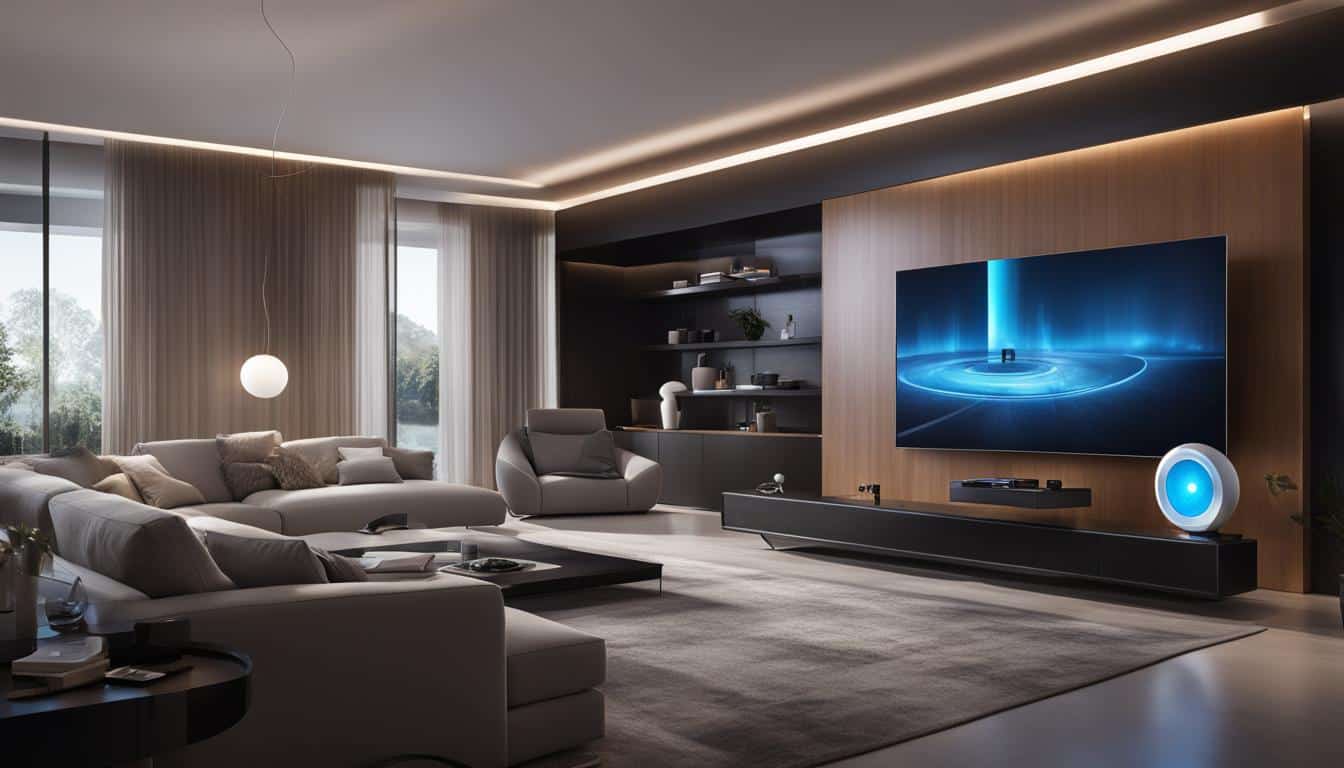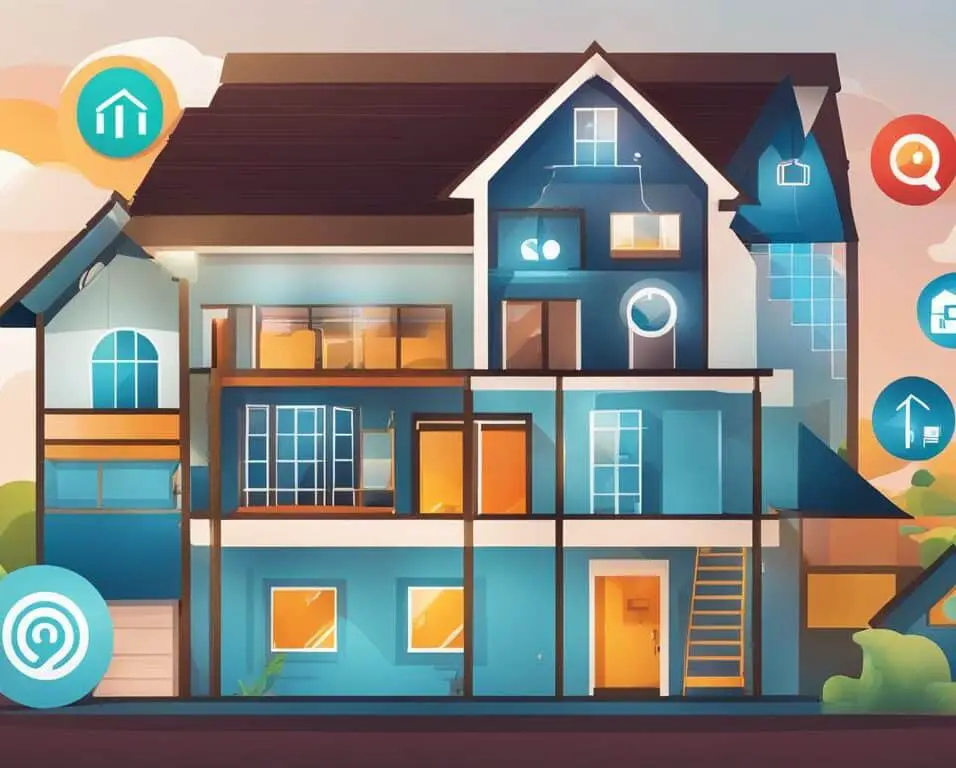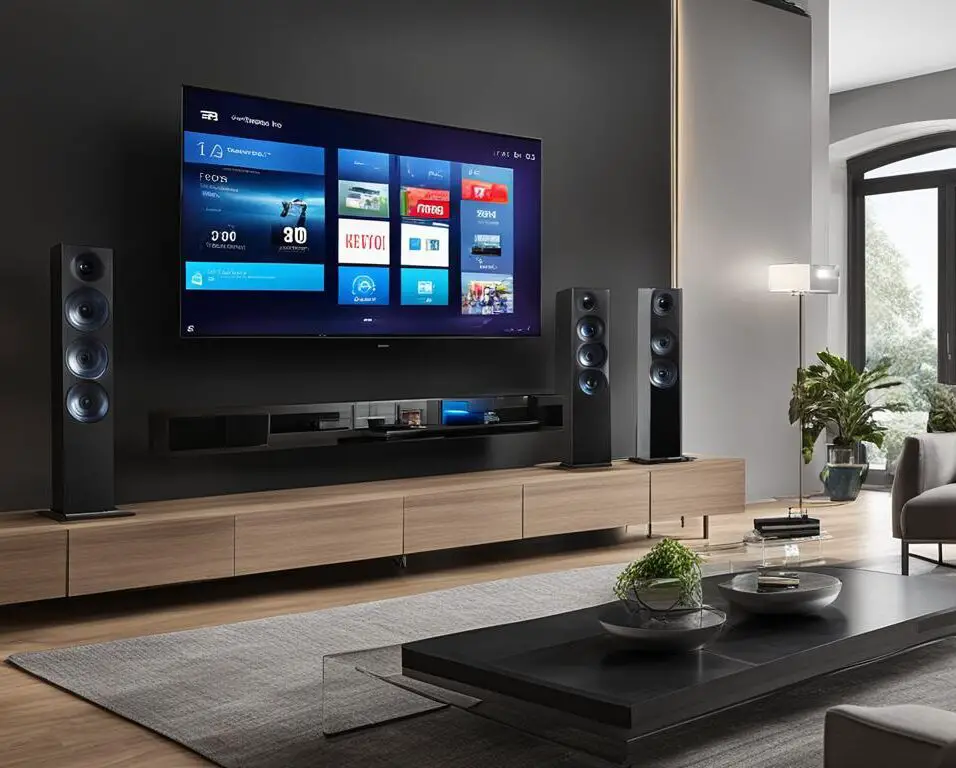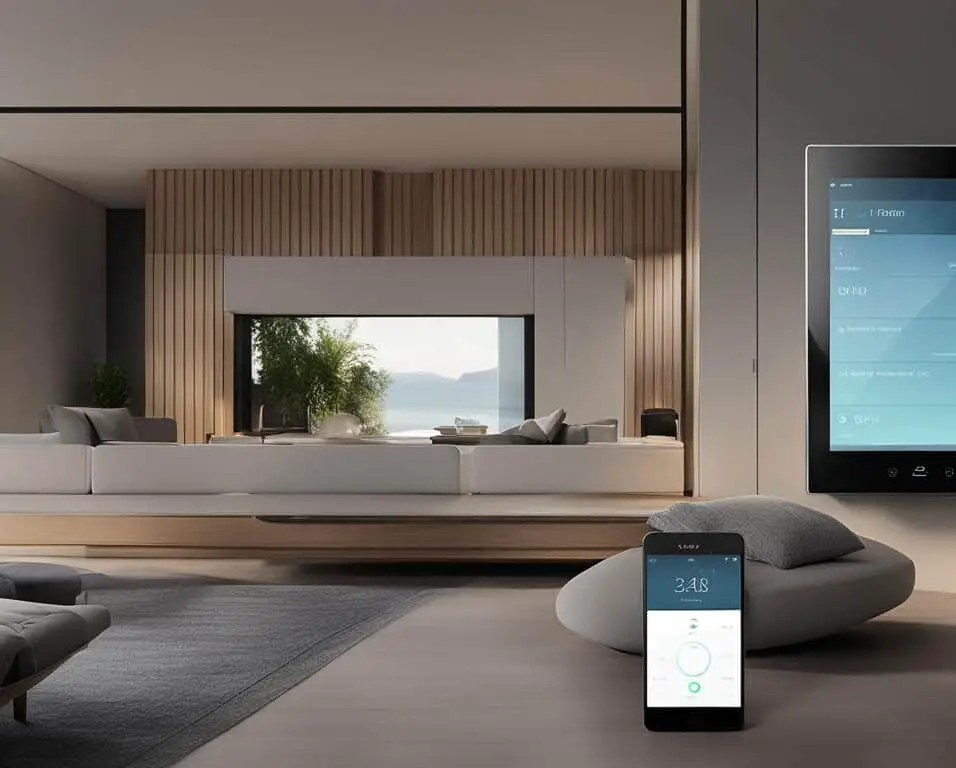Integrating Voice Control with Your Smart Home System
Voice control has become a game-changer in the world of smart home automation. With the rise of voice-controlled devices and the advancements in voice assistant technology, homeowners now have the ability to effortlessly control their connected smart home devices using simple spoken commands.
Imagine being able to turn on the lights, adjust the thermostat, and lock the doors, all without lifting a finger. This level of convenience and ease is now a reality, thanks to voice control systems.
Whether you have a busy lifestyle, mobility issues, or just want to add a touch of futuristic technology to your home, integrating voice control with your smart home system is a smart move.
Key Takeaways:
- Voice control platforms offer a hands-free way to operate lights, thermostats, door locks, and more.
- Over a quarter of US adults now own a smart speaker, and this number is predicted to rise to 55 percent by 2022.
- Voice control systems have been engineered with advanced microphones, speech recognition engines, and integration with popular home control systems.
- Voice control is gaining momentum in the smart home industry and is recognized as a solution for those with poor vision, mobility, or a fear of technology.
- Integrating voice control with your smart home system can enhance convenience, simplify home management, and provide a personalized user experience.
The Power of Voice Assistants in Smart Home Automation
Voice assistants, such as Amazon Alexa, Google Assistant, and Apple Siri, have revolutionized smart home automation by providing users with seamless voice-controlled experiences. These advanced technologies serve as central hubs, integrating and controlling multiple smart devices from different manufacturers. With voice assistant technology, users can effortlessly manage their smart home systems, enhancing convenience, personalization, and security.
One of the key strengths of voice assistants is their ability to offer personalized experiences. Through advanced AI algorithms, these voice-controlled devices learn user preferences, enabling them to tailor responses and commands to individual needs. They can adjust lighting based on personal preferences, create custom routines for daily tasks, and even curate entertainment options based on individual tastes.
Additionally, voice assistants go beyond basic control functions and offer extensive smart home integration. They can act as a unifying force, connecting devices such as lights, thermostats, door locks, and security systems. This integration allows for seamless interoperability, enabling users to control multiple devices simultaneously with a single voice command. Voice assistants can also support third-party app integration, expanding their capabilities and providing access to a wide range of smart home services and features.
Voice assistants simplify smart home management and enhance convenience, personalization, and security.
Furthermore, voice assistants contribute to enhanced security and peace of mind. They can integrate with home security systems, allowing users to remotely monitor surveillance cameras, lock doors, and receive real-time alerts. This integration provides an added layer of protection to smart homes, empowering users to stay connected and in control even when away.
Table: Comparison of Voice Assistant Technologies
| Voice Assistant | Main Features | Integration | Compatibility |
|---|---|---|---|
| Amazon Alexa | Advanced AI algorithms, third-party app integration, personalized experiences | Wide range of smart devices, home automation systems, entertainment systems | Compatible with various smart home devices and platforms |
| Google Assistant | Natural language processing, personalized recommendations, voice match feature | Integration with Google Nest devices, smart home automation systems | Compatible with a growing number of smart home devices |
| Apple Siri | Seamless integration with Apple ecosystem, personalized responses, HomeKit support | Control of Apple HomeKit-enabled devices, smart home automation platforms | Compatible with Apple HomeKit-certified devices |
In conclusion, voice assistants have revolutionized the way we interact with our smart homes. These voice-controlled devices offer personalized experiences, seamless integration, and enhanced security features. As voice assistant technology continues to evolve, we can expect even more advanced capabilities and integration possibilities, further enhancing the power of smart home automation.
The Future of Voice Assistants in Smart Home Automation
Voice assistants have revolutionized the way we interact with our smart homes, and their potential for the future is boundless. As voice control technology continues to advance, it offers an effortless and intuitive way to manage our smart devices, eliminating the need for manual control methods. The integration capabilities of voice assistants serve as a centralized control hub, streamlining the management of multiple devices, making smart home management more seamless than ever.
One of the key advantages of voice assistants is their ability to automate tasks and create personalized commands and routines. This not only saves time but also adds a new level of convenience to daily living. With just a simple voice command, you can have your lights dim, thermostat adjust, and favorite music start playing simultaneously. Voice assistants adapt to individual preferences, learning your habits and preferences over time, providing a truly personalized user experience.
In addition to convenience, voice assistants also contribute to energy efficiency in smart homes. With real-time energy consumption statistics and the ability to control energy-consuming devices, users can make informed decisions that reduce their environmental impact. By simply asking your voice assistant to turn off unnecessary lights or adjust the thermostat, you can actively participate in creating a more sustainable living environment.
Looking ahead, the future of voice assistants in smart home automation holds great promise. As technology continues to evolve, we can expect even more advanced features and integration possibilities. From enhanced voice recognition to seamless integration with other connected devices, voice assistants will undoubtedly play a pivotal role in shaping the future of smart home management.
FAQ
How does voice control integrate with smart home systems?
Voice control platforms offer a hands-free way to operate lights, thermostats, door locks, and more. They are engineered with advanced microphones, speech recognition engines, and integration with popular home control systems, allowing one spoken phrase to command multiple devices at once.
What are voice assistants and how do they enhance smart home automation?
Voice assistants, such as Amazon Alexa, Google Assistant, and Apple Siri, are central hubs that integrate and control multiple smart devices from different manufacturers. They offer hands-free control, personalized experiences, and can manage entertainment systems, support third-party app integration, and enhance home security by integrating with security systems.
What benefits do voice assistants provide for smart home management?
Voice assistants simplify smart home management by allowing users to effortlessly control their smart devices through voice commands. They can act as a centralized control hub, streamlining the management of multiple devices. Automation features enable users to create personalized commands and routines, saving time and adding convenience to daily living. Voice assistants also contribute to energy efficiency by allowing users to control energy-consuming devices and providing real-time energy consumption statistics.
How do voice assistants offer a personalized user experience in smart home automation?
Voice assistants utilize advanced AI algorithms to learn user preferences and provide personalized experiences. They can understand and adapt to individual preferences, enhancing the overall smart home management and offering a tailored user experience.
What can we expect from the future of voice assistants in smart home automation?
As voice assistants continue to advance, we can expect even more advanced features and integration possibilities. They have the potential to revolutionize the way we interact with our smart homes, offering enhanced convenience, personalization, and security.
Source Links
- https://htacertified.org/app/articles/voice-control-in-the-smart-home/
- https://www.electronicdesign.com/technologies/embedded/article/21252996/knowles-electronics-enhancing-smarthome-experiences-with-aibased-voice-control
- https://energy5.com/the-integration-of-voice-assistants-in-smart-home-automation








